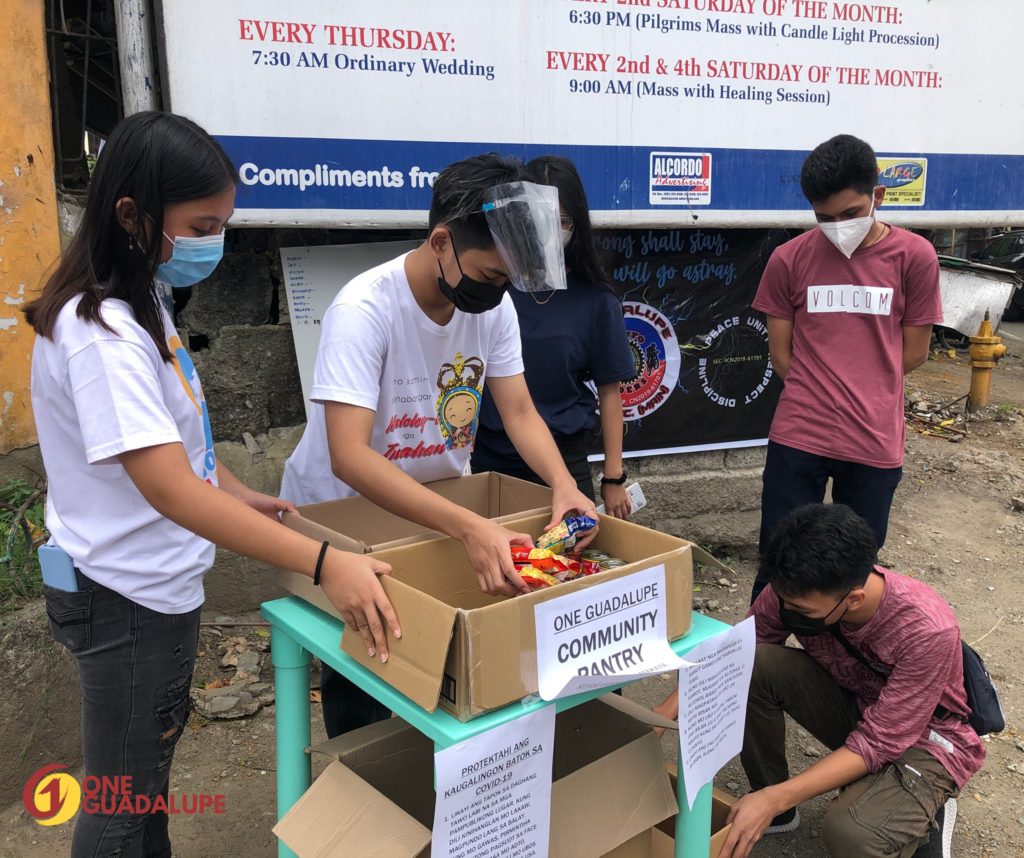No permits required for community pantries — Cebu City barangays

Photo Courtesy of One Guadalupe.
CEBU CITY, Philippines — There will be no permits required of community pantries set up by residents in the city.
The Association of Barangay Councils (ABC) through its president, ex-officio Councilor Franklyn Ong, told CDN Digital that this practice is a laudable community initiative of people who want to help each other amid the trying pandemic.
With this, he said that barangays in Cebu City are advised to let the community pantries be and extend help when asked for by the organizers in terms of keeping order in these pantries.
Ong said that because the movement is fairly new, there is no apparent need for government intervention yet, although the barangays should also monitor the pantries to ensure that social distancing is observed.
“That’s a very noble project. For now, ang question nato ana is the sustainability unsa gyod ni siya magdugay. Wa man sad nay income and bag-o pa nigawas, nalipay ang tanan. As long as walay mocomplain, wala tay problema ana,” he said.
The only request of the barangay chiefs is that community pantries do not block the roads or alleyways where people would often pass.
Ong noted that every location would be different and may require different attention from the barangay.
“Dili pa karon angay maghuna-huna kon kailangan ba magpermit wala ra na. Mura man gud na siyag bayanihan, tinabangay. So, okay na siya. We will just cross the bridge again in a few months kung unsay development ana,” said Ong.
Should the community pantries persist for a few weeks or months, the ABC will meet to discuss how to deal with them in the long term, but as the village chiefs do not expect the pandemic to last forever, they also expect the community pantries to be gone when the economy would have bounced back.
The statement of the Department of the Interior and Local Government (DILG) on the matter of community pantries had organizers in Cebu City confused.
DILG Secretary Eduardo Año initially said these pantries need permits from the barangays but later retracted the statement saying there is no need for government intervention for a project initiated by the communities themselves.
Año further added that organizers should coordinate with the barangays to maintain order.
One Guadalupe was the first to put up a community pantry in the city in Barangay Guadalupe in two areas and they have been studying the viability of community pantries.
Michael Angelo Quijada, the executive director of One Guadalupe, said that they began the project on April 19, 2021, to mirror the community pantries in Quezon City in hopes to alleviate the hunger of people who are economically suffering through the pandemic.
For the last two days, the group saw a surge in donations as well as beneficiaries in the two stalls. The stalls remained assisted to avoid violating the social distancing protocol.
The concept of the pantry was that people donated food to the pantry so that people in need can take what they need as well, while in turn donating what they have in exchange.
“Naa toy mga nikuhag pan duha kabuok and wala silay dala atong panahona nga ikahatag balik. Nahibulong mi kay taod-taod nibalik sila nagdala buwad. Heartwarming kaayo,” said Quijada in a phone interview.
Sugbo Cares, a Cebu-based organization, is using Barangay Guadalupe as a pilot area for their project of a province-wide community pantry.
For now, Quijada said that the system needs to be improved so that volunteers will no longer man these community pantries.
The study should help the organization set up community pantries that they hope will be for long term.
Guadalupe is not the only village in the city that has adapted the community pantry trend. Barangay Tisa also recently reported that one community has set up its own community pantry.
For now, these pantries have been receiving support from the public and no complaints yet have been heard from the residents. /rcg
Disclaimer: The comments uploaded on this site do not necessarily represent or reflect the views of management and owner of Cebudailynews. We reserve the right to exclude comments that we deem to be inconsistent with our editorial standards.
